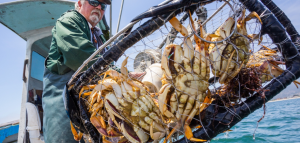A NOAA-supported study projects that Dungeness crab and some commercial finfish species living on the sea floor may decline in future years due to increased ocean acidification in the California Current. These estimates were based on computer models forecasting changes in the California Current ocean ecosystem, which includes an expected rise in summer ocean acidification of 50 percent. Other marine organisms, including zooplankton, seabirds, marine mammals, and fish that live in the water column, are expected to be less affected.

Ocean acidification occurs when oceans partially absorb the increasing carbon dioxide in the atmosphere, resulting in a series of chemical reactions that decrease the pH of the seawater, making it more acidic. This process is exacerbated in the California Current during summer, when coastal upwelling brings cold, deep, nutrient-rich waters up onto the continental shelfthat already have higher acidity and low oxygen concentrations.
Project scientists used global projections of CO2over the next fifty years, chemical and physical oceandata,and the ecology of 75 different species to project thefuture relative abundance of each, along with potentialeconomic impacts. Ocean acidification is expected to directly affectcertain food source species (shrimps, benthic grazers, benthic detritivores, bivalves) within the marine food web that are eaten bysomecommercially valuablespecies, including Dungeness crab, rockfish and sole.
The model provides information on species relevant to particular management focus areas (e.g., nearshore state-managed fisheries, or the groundfish management team with the Pacific Council). This could help prioritize management efforts with regards toocean acidificationby highlightingdirect impacts to commercial specieand the supporting role that shellfish and other species play in the food web.
For more information, check out the p roject page and contact Shallin Busch ( shallin.busch@noaa.gov ) or Beth Turner ( Elizabeth.turner@noaa.gov ).
See also, ‘ Study predicts decline in Dungeness crab from ocean acidification,’ Seattle Times, 15 January 2017.
